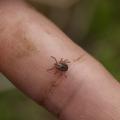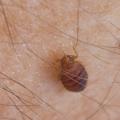Insects-Human Pests
Insects and other arachnids such as ticks and mites directly and indirectly affect the lives of all Mississippi citizens – directly by bites and stings, and indirectly by disease transmission and allergies. Nuisance biting by mosquitoes, ticks, fleas, chiggers, and the like can make outdoor activity miserable at times. Insects and arachnids like mosquitoes and ticks bite people and sometimes spread serious diseases. Also, pests such as cockroaches and house dust mites can cause allergic reactions in people prone to allergies.
Successful control of these pests requires proactive planning, proper pest identification, understanding pest biology, and a sound knowledge of control options and how and when to apply control measures. Insecticides are important tools for controlling insect and arachnid pests, but insecticides are only one of many methods of insect prevention and management. Personal protection measures are important, such as wearing long sleeves and long pants when in places with numerous biting pests, as well as proper use of insect repellents. When insecticides are needed, knowing which insecticide to use and how to apply it safely is critical to obtaining effective control for minimum cost and effort.
Publications
News
There’s nothing like spending time in the great outdoors! Whether you’re camping or hiking, or even gardening or lounging, it’s important to protect yourself from ticks.
When bedbug outbreaks make headlines, many travelers feel itches that may not exist because of the psychological trauma these pests inflict. The Centers for Disease Control and Prevention has long classified bedbugs as a public health pest. These tiny parasites feed on the blood of humans and animals. Adult bedbugs are reddish-brown, have six legs and two antennae and are about the size of Abraham Lincoln’s engraved head on a penny.




